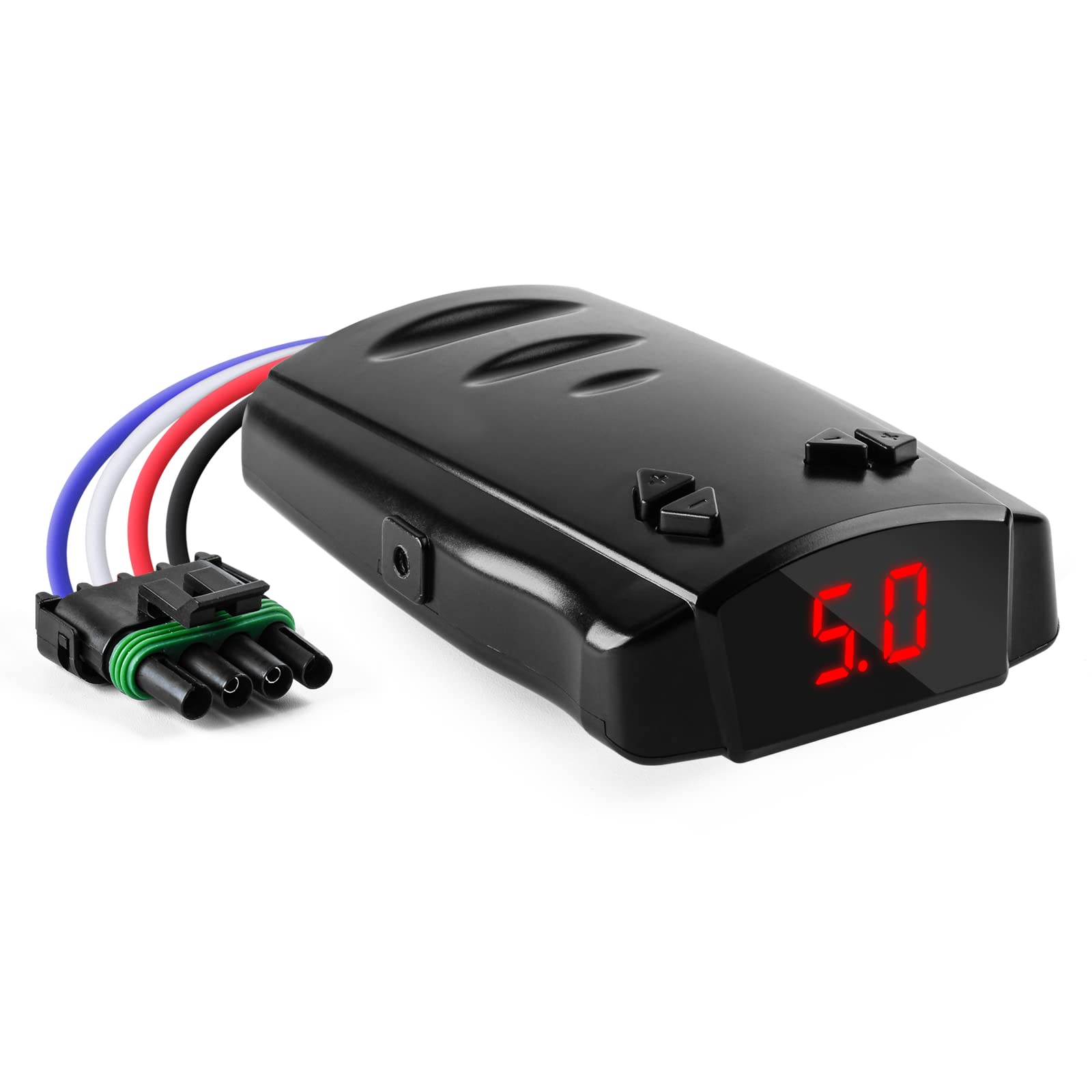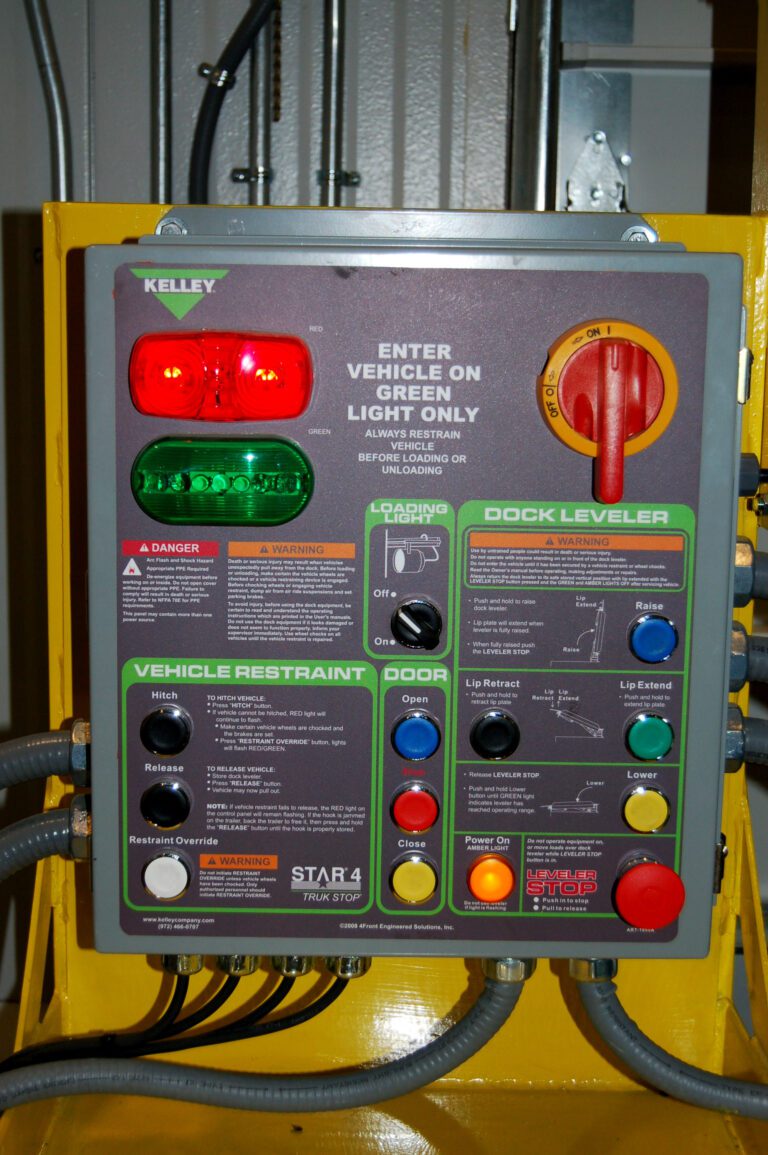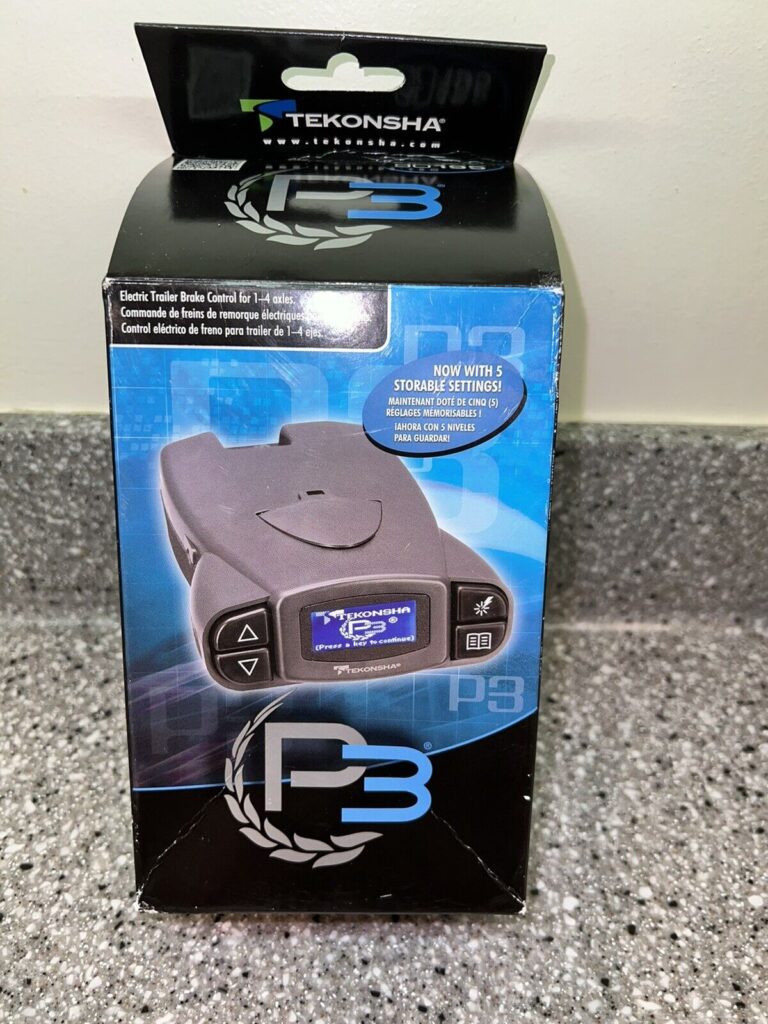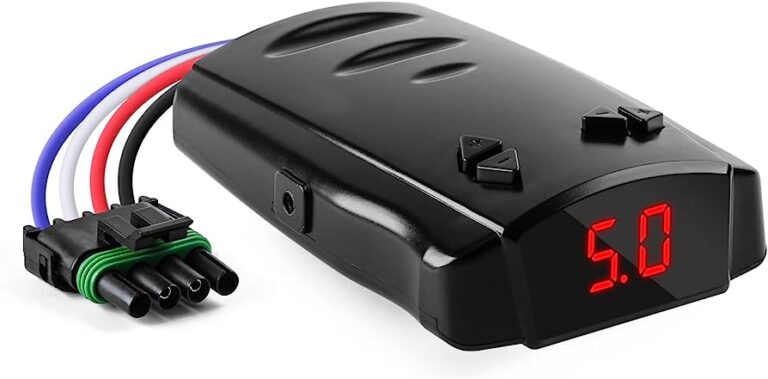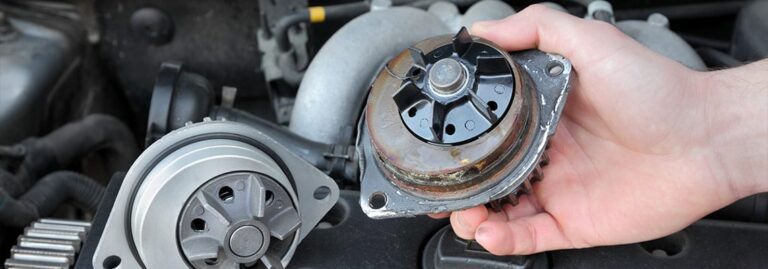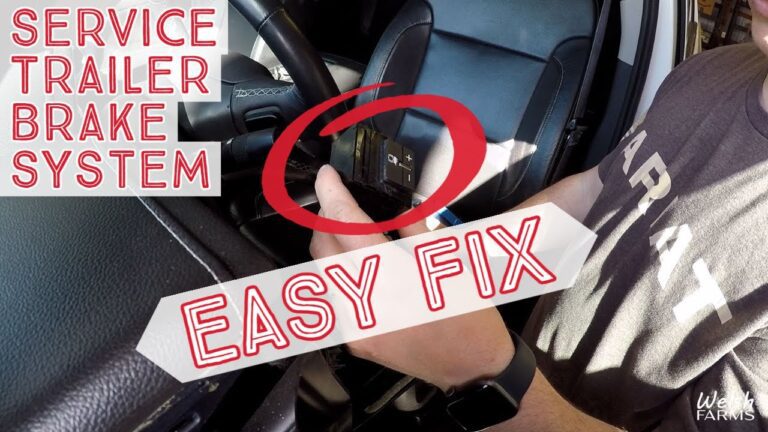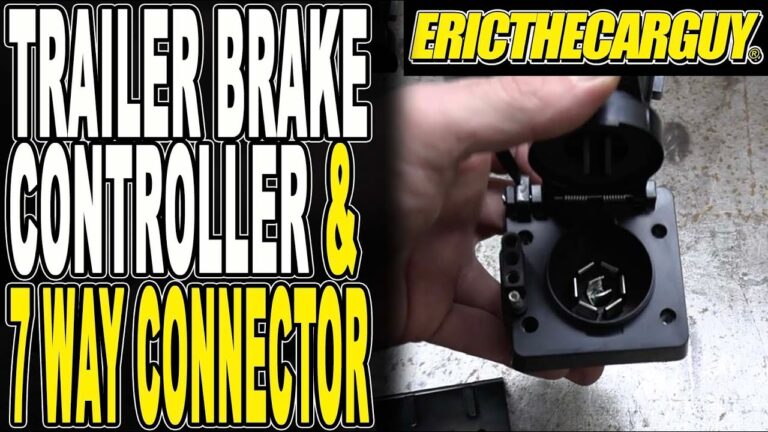What’s the Perfect Trailer Brake Gain Setting for Safe Towing?
Your trailer brake gain should be set according to the manufacturer’s recommendation based on the weight of your trailer and the towing vehicle. The gain should be adjusted until the trailer brakes engage smoothly without locking up or jerking the vehicle.
Properly setting the brake gain is crucial for ensuring safe and smooth towing of a trailer. This setting controls the amount of braking force applied to the trailer axles when the towing vehicle’s brakes are engaged. If the gain is too low, the trailer may not brake sufficiently, causing excessive strain on the towing vehicle’s brakes and increasing the risk of accidents.
On the other hand, if the gain is too high, the trailer brakes may lock up, causing the tires to skid and potentially jackknifing the trailer. Therefore, it is essential to follow the manufacturer’s guidelines and adjust the brake gain accordingly.
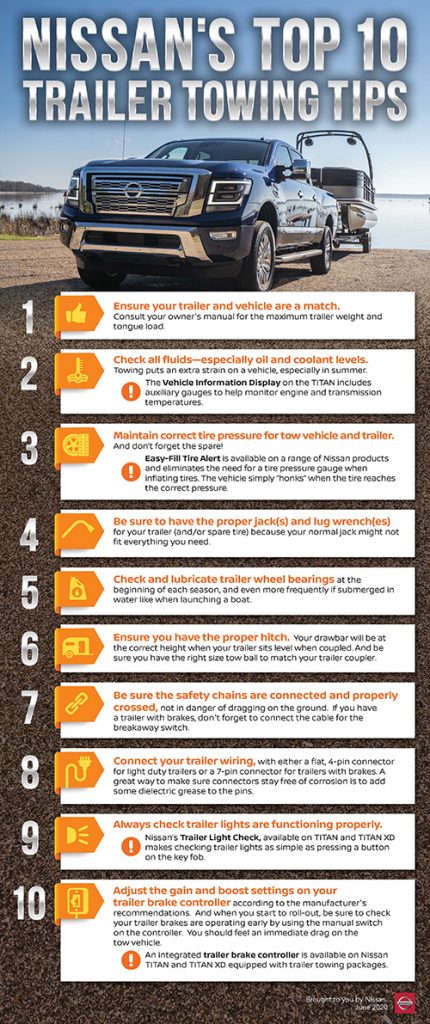
Credit: www.passportnissanva.com
The Importance Of Proper Trailer Brake Gain Setting
Towing a trailer is no easy feat, and it’s crucial to ensure that your trailer brake gain is properly set to prevent accidents while on the road. Whether you’re towing a small utility trailer or a large camper, the trailer brake gain is critical in controlling your trailer’s braking system.
Why Setting The Trailer Brake Gain Is Critical For Safe Towing?
Improper trailer brake gain setting can lead to disastrous outcomes. If the gain isn’t set high enough, your trailer’s brakes won’t engage, and the vehicle won’t stop as quickly as it should. On the other hand, if the gain is set too high, your trailer’s brakes will engage too quickly, and your vehicle won’t be able to maintain control.
Here are some other reasons why setting the trailer brake gain is critical for safe towing:
- Proper brake gain setting allows your vehicle to maintain control while towing.
- It ensures the trailer brakes engage at the same time as the tow vehicle’s brakes.
- Setting the gain properly protects your trailer axles from premature wear and tire damage.
- Properly functioning brakes are critical in difficult driving conditions, such as steep hills, sharp curves, and slippery roads.
The Consequences Of Incorrect Settings.
Failure to set your trailer brake gain correctly can lead to disastrous results. Here are some significant consequences of incorrect brake gain settings:
- Overheated brakes and premature brake wear on the trailer.
- Low breaking performance and longer stopping distances.
- Losing control of your rig, which can cause an accident.
- Foot and back injuries from overexertion on long journeys.
It’s crucial to ensure that the trailer brake gain is appropriately set before hitting the road to prevent these consequences.
Properly setting your trailer brake gain is essential for safe towing. Understanding how the gain works will help to prevent any accidents while on the road. Remember, always be sure to follow the owner’s manual instructions for your specific vehicle and type of trailer for the best results.
Understanding Trailer Brake Gain
Trailer brake gain plays a crucial role in ensuring your towing safety. It is the component that sets the amount of braking power to your trailer’s electric brakes. Understanding trailer brake gain is essential to ensure you have a smooth and safe towing experience.
Definition Of Trailer Brake Gain
Trailer brake gain is a setting that decides how much braking power your trailer’s electric brakes should apply when the tow vehicle brakes are activated. It is measured as a percentage of the maximum braking power your trailer’s electric brakes can provide.
How To Adjust Trailer Brake Gain
Adjusting your trailer brake gain may vary based on your brake controller. You should always refer to your controller’s manufacturer’s manual before attempting to adjust your trailer brake gain. Here are the steps for adjusting your trailer brake gain:
- Connect the trailer to the tow vehicle
- Find an empty parking lot or an isolated road, free from other vehicles and pedestrians
- Set the brake controller to a low gain of around 10 percent
- Drive the vehicle up to a speed of around 25 mph
- Apply the brake pedal and check if the trailer brakes are engaging
- If the trailers aren’t stopping the vehicle as desired, increase the brake gain
- Repeat until you find the optimal brake gain where the trailer brakes are engaging, but not too much to cause skidding
- Once you find the optimal setting, you’re all set to hit the road!
Typical Gain Settings And Their Effect On Towing Safety
Choosing the optimal brake gain settings is crucial to ensure your safety while towing. Here are typical gain settings and their effects on towing safety:
- Low gain (5-10%) – this setting may not provide enough braking force to stop the trailer effectively, especially for larger and heavier trailers. It’s best to use this setting when the trailer is empty or carrying lightweight cargo. Leaving it in this setting with a heavy load would have a significant impact on your towing safety.
- Medium gain (10-20%) – this setting provides sufficient braking force to stop the trailer effectively, even with a heavier payload.
- High gain (20-25%) – this setting provides a much more significant amount of braking power, ideal for situations where you’re towing heavy loads or driving through mountainous regions.
Always adjust your trailer brake gain settings based on your tow vehicle or trailer weight, driving conditions, and cargo load. Doing so ensures your safety while also keeping your vehicle and trailer brakes protected from unnecessary wear and tear.
Factoring In Towing Conditions For Brake Gain Adjustment
No matter how experienced you are in towing, the brake gain setting is crucial for ensuring your trailer’s safety. When it comes to setting your trailer brake gain, always consider the towing conditions to adjust it correctly. Here are some important factors to keep in mind:
Towing Weight And Its Effect On Brake Gain.
The weight of your trailer and cargo determines how much brake gain you’ll need. The heavier your load, the more brake gain you’ll need because it takes longer to stop. It’s possible to get a feel for the trailer’s weight and braking power, but it’s best to use a brake controller with an adjustability feature.
With that feature, you can increase or decrease the braking power as needed.
When it comes to heavy cargo, remember that the gross combined weight rating (gcwr) of the towing vehicle and the trailer must not be exceeded.
Weather Conditions And Brake Gain Adjustments
Weather conditions can significantly affect your stopping distance, so they should be taken into account when setting your brake gain. On wet or slippery roads, you should increase the brake gain slightly to ensure that the trailer brakes engage more aggressively.
How Stopping Power Influences Brake Gain Levels.
Stopping power is a crucial factor to consider, and it’s essential to ensure that your trailer brakes are adequate for the total weight of your trailer. The ideal brake gain level should provide enough force to stop the trailer safely and quickly.
An insufficient brake gain can cause the trailer to push the tow vehicle, while excessive braking can cause the trailer to lose traction or have its brakes lock up.
If you’re unsure about the correct brake gain setting, it’s best to take your trailer to a qualified mechanic for assistance. They can help to ensure that your trailer’s brakes are adjusted correctly for your towing conditions, including the weight of the trailer, weather conditions, and stopping power.
Remember to test your trailer brakes before each trip to ensure they engage properly, and always take the necessary safety precautions when towing.
Checking The Trailer Brake System
Before you start towing your trailer, it’s essential to ensure that the brake gain on the trailer is set correctly. The ideal brake gain setting depends on the trailer’s weight and the tow vehicle’s braking capacity. Here’s how to check the trailer brake system:
Pre-Towing Inspection Of The Trailer Brakes
Before checking the brake gain settings, inspect the trailer brakes to ensure that they are in good working condition. Here are some steps to follow:
- Check for any visible signs of damage or wear and tear on the brake components.
- Ensure that the brake pads are not worn out, and the brake lines are intact.
- Inspect the brake drums for any signs of overheating, such as discoloration or warping.
- Test the brake system by applying the brakes and checking for any abnormal sounds or vibrations.
If you notice any issues with the brake system, such as worn-out brake pads or damaged brake components, it’s essential to get them fixed before towing the trailer.
How To Check For Misaligned Or Worn Brake Pads?
A misaligned or worn brake pad can cause the trailer to pull to one side or experience uneven braking. Here’s how to check the brake pads:
- Lift up the trailer and remove the wheel.
- Inspect the brake pad for any visible signs of wear, such as a thin pad or uneven wear.
- Check the brake pad’s alignment with the brake rotor to ensure that it is straight and not crooked.
If you notice any signs of misalignment or wear, it’s advisable to get the brake pads replaced or repaired.
Finding Brake Controller Issues That Could Affect The Setting.
The brake controller is responsible for adjusting the brake gain setting to ensure that the trailer brakes apply enough pressure to slow down the trailer. If the brake controller is not working correctly, it can affect the brake gain setting.
Here are some signs of brake controller issues:
- The trailer brakes are not engaging when the brake pedal is pressed.
- The trailer brakes are applying too much pressure, causing the trailer to stop abruptly.
- The brake controller is not adjusting the brake gain setting based on the trailer weight or the tow vehicle’s braking capacity.
If you notice any of these issues, it’s essential to get the brake controller checked and repaired by a professional mechanic.
It’s essential to check the trailer brake system before towing the trailer to ensure that it’s safe and functioning correctly. Inspect the brake components, check for misaligned or worn brake pads, and ensure that the brake controller is working correctly to adjust the brake gain setting.
By following these steps, you can ensure a smoother and safer towing experience.
Adjusting The Trailer Brake Gain
Have you ever noticed that your trailer brakes aren’t working the way they should be? It might be time to adjust the brake gain. The brake gain determines the strength of the brakes, and it should be set correctly to avoid any potential accidents on the road.
In this blog post, we’ll discuss how to adjust the trailer brake gain and what gain level is appropriate for different types of loads.
The Best Way To Make Sure The Gain Is Correctly Set.
Before setting the gain, you need to make sure your trailer brakes are properly installed, and all wires and brake controllers are working correctly. You can check the brake controller by trying the manual lever. If the trailer brakes don’t engage, then you know something is not right.
Once you’ve confirmed the brake controller is working correctly, follow these steps to ensure the gain is correctly set.
- Start by going to an empty parking lot, where you have enough space to drive slow and stop suddenly.
- Connect your trailer to the tow vehicle, and make sure the brake controller is properly attached and working correctly.
- Start driving at a slow pace, around 10mph, and then apply the brakes to come to a complete stop.
- If the trailer brakes are grabbing too hard and locking up the trailer wheels, then lower the brake gain.
- If the trailer brakes aren’t engaging enough, then increase the brake gain.
- Repeat these steps until you have the gain at the correct level.
How To Test Brake Balance And Adjust Gain Accordingly?
Another way to ensure your brake gain is correct is by checking for brake balance. Brake balance refers to the evenness of the brake pressure between the tow vehicle and the trailer. An imbalance can cause problems like fishtailing or trailer sway.
To check brake balance, follow these steps:
- Start by going to a flat, straight road where you have enough space to drive at a moderate speed.
- Accelerate to around 30mph and then apply the brakes to come to a complete stop.
- Evaluate how the trailer is moving. If the trailer is pulling to the left or right, then the brake balance is off.
- Adjust the brake gain to balance the brakes.
What Gain Level Is Appropriate For Different Types Of Loads?
The gain level you need depends on the weight of your trailer and the load you’re carrying. Generally, heavier loads require more gain to stop safely. Here are some guidelines for setting the gain level based on the load you’re carrying:
- Empty trailer: 5-10% gain
- Lightweight load (under 2,000 lbs): 10-15% gain
- Moderate load (2,000-5,000 lbs): 12-18% gain
- Heavy load (over 5,000 lbs): 15-25% gain
Make sure to adjust your gain accordingly if you’re carrying different loads or hauling multiple trailers of varying weights.
Adjusting the trailer brake gain is an essential part of towing safety. Make sure to test your brake gain by checking for brake balance and testing your trailer’s brakes, and adjust accordingly based on the load you’re carrying. With proper brake gain adjustment, you can ensure that your trailer brakes are working correctly and avoid any potential accidents on the road.
Maintenance Of Trailer Brakes
Trailer brakes are an important aspect of towing a trailer. It is essential to set your trailer brake gain at the right level to ensure that your trailer stops safely. In addition, routine maintenance on trailer brakes should be done to avoid potential problems.
Below are some important things you need to know about trailer brake maintenance.
Routine Maintenance That Needs To Be Conducted On Trailer Brakes
The following are essential maintenance tips to help keep your trailer brakes in good condition:
- Check the brakes occasionally to ensure there is no damage or wear.
- Cleaning the brakes regularly can help prevent corrosion and rust, which affects the efficiency of the brake system.
- Apply lubricant to the moving parts of the brake system; this helps to maintain the brakes’ function.
- Inspect your brake pads for wear at least once a year or more frequently if you use them extensively.
How Often Should A Trailer Brake Inspection Be Done?
Performing brake inspections is an essential maintenance routine that ensures your brake’s safety. An inspection should be conducted every 12 months or at least every 10,000 miles you have driven. However, in some cases, you may need an inspection more frequently, such as before a long trip or if your brakes have been in use extensively.
Regular maintenance on your trailer brakes is vital to avoid any potential issues that may lead to accidents. Make sure you conduct routine maintenance and have regular inspections to ensure your trailer brake system is working to its optimum capacity.
Safety Driving Tips When Towing With Brakes
Following Safety Guidelines When Towing A Trailer With Brakes
Towing a trailer with brakes may seem simple enough, but it’s important to follow safety guidelines to ensure a safe and stress-free journey. Here are some safety tips to keep in mind:
- Always make sure your brakes are properly adjusted and in good working condition before hitting the road.
- Be aware of the weight capacity of your vehicle and the trailer. Overloading your trailer can cause serious problems while braking, including jackknifing and loss of control.
- Always use a proportional brake controller, which applies proportional braking force based on the weight of the trailer. This helps ensure that the trailer’s brakes are working in sync with the tow vehicle’s brakes.
- Use your mirrors and be mindful of your speed. Towing a trailer affects braking distance, so give yourself plenty of space to stop safely.
- Avoid sudden braking or sharp turns. Towing can be unpredictable, so try to anticipate potential situations before they become hazards.
Avoiding Common Mistakes That Affect Towing With Brakes
Making mistakes when towing with brakes can seriously impact your safety and the safety of others on the road. Here are some common mistakes to avoid:
- Not starting with enough brake gain. Brake gain refers to the amount of force that the trailer brakes apply compared to the tow vehicle’s brakes. Adjusting the brake gain too low can mean the trailer won’t brake enough, while setting it too high can cause the trailer brakes to lock up. Start with a low setting and gradually increase until you achieve the desired braking force.
- Setting the brake gain too high. As mentioned, setting the brake gain too high can cause the trailer brakes to lock up. This can lead to serious problems while towing, and could even cause a collision.
- Neglecting to check the brake lights. Brake lights are essential for safety when towing a trailer with brakes. Always double check that they’re functioning properly before hitting the road.
- Not considering road conditions and the weather. Wet or slippery conditions can affect braking distance, so stay alert and adjust your driving accordingly. If you’re not comfortable towing in certain weather conditions, consider waiting until the roads clear up.
Remember, towing with brakes requires extra care and attention. By following safety guidelines and avoiding common mistakes, you can ensure a safe and enjoyable experience for everyone on the road.
Importance Of A High-Quality Trailer Brake Controller
When it comes to towing, your trailer brake gain setting is an essential factor in ensuring your safety on the road. A high-quality brake controller plays a crucial role in determining the gain setting, making it vital to choose one that meets your specific needs.
Here, we will discuss the role of the brake controller in determining the gain setting and how to choose a high-quality brake controller for safe towing.
The Role Of The Brake Controller In Determining The Gain Setting
The gain setting is the level of braking power applied to the trailer when you brake. A high-quality brake controller can help adjust this setting to ensure the appropriate amount of braking power to avoid accidents. Here are some key points to consider:
- A trailer brake controller sends a signal to the trailer’s electric brakes when you hit the tow vehicle’s brakes.
- The controller regulates the amount of voltage sent to the electric brakes on the trailer, adjusting the gain setting.
- You need to have an appropriate gain setting to avoid overbraking or underbraking.
How To Choose A High-Quality Brake Controller For Safe Towing
Choosing a brake controller could be overwhelming. Still, it’s essential to make an informed decision to ensure that your trailer is safe on the road. Here are the factors to consider when selecting a brake controller:
- Type of controller: Decide what type of controller you need: time-delayed or proportional.
- Number of axles: The number of axles on your trailer determines the type of brake controller you need.
- Sensitivity adjustment: Choose a brake controller with a sensitivity adjustment feature.
- Display type: A brake controller with a digital display makes it easier to monitor and adjust the gain setting.
- Price: Consider the cost of the brake controller. A high-quality one can be expensive, but it’s worth the investment for your safety.
- Compatibility: Ensure the brake controller you choose is compatible with your vehicle’s electrical system and brake type.
Choosing the correct brake controller and gain setting are essential for safe towing. By following these guidelines and selecting a good quality brake controller, you can help ensure that your trailer’s brakes are working efficiently, providing required safety on the road.
Recap Of The Main Points
Highlighting The Main Points Covered
Proper gain setting is essential for safe trailering. In this blog post, we’ve discussed the key points you need to keep in mind while setting the brake gain of your trailer. Here’s a quick recap of the main points covered:
Importance Of Proper Gain Setting
- The brake gain setting determines the amount of braking force applied to the trailer.
- Too much or too little gain can cause instability and unsafe driving conditions.
- Proper gain setting ensures efficient use of trailer brakes and reduces wear and tear of brakes and tires.
Factors That Affect Gain Setting
- Trailer weight and size affect gain setting.
- The road surface condition, weather, and driving speed also impact gain setting.
- Always refer to the manufacturer’s instructions for the recommended gain setting for your specific situation.
How To Set Trailer Brake Gain
- Start by setting the gain to the mid-point and test it with the help of a friend.
- Make necessary adjustments to ensure smooth braking and avoid overloading of the trailer.
- Always double-check the gain setting before hitting the road.
By following these key points, you can ensure your trailer brake gain is set correctly and safely. Remember to always prioritize safety and follow the manufacturer’s instructions.
Frequently Asked Questions Of What Should My Trailer Brake Gain Be Set At
What Is Trailer Brake Gain?
Trailer brake gain is a setting that controls the force exerted on the brakes when you apply the brakes in your tow vehicle. It is measured as a percentage of braking power.
How Do I Determine Trailer Brake Gain?
To determine the trailer brake gain setting for your tow vehicle, you need to perform a series of tests. Start with a gain of around 5 and gradually increase it until the braking force is sufficient to stop the trailer without locking up the wheels.
What Happens If The Trailer Brake Gain Is Too High?
If the trailer brake gain is too high, the brakes will lock up and the vehicle may skid. This can result in loss of control and an accident. It can also cause excessive wear and tear on the brake system.
What Happens If The Trailer Brake Gain Is Too Low?
If the trailer brake gain is too low, the brakes will not provide enough stopping power. This can cause the vehicle to take longer to stop and may result in an accident. It can also cause excessive wear on the tow vehicle’s brakes.
How Often Should I Check My Trailer Brake Gain?
Trailer brake gain should be checked every time you tow a trailer with your vehicle. You should also check it if you change trailers, change tires, or make modifications to your vehicle or trailer. Always ensure that your trailer gain setting is ideal before you set off on a journey.
Conclusion
After thorough research and analysis, it is clear that setting the trailer brake gain correctly is crucial for safe and efficient towing. The ideal brake gain setting may vary based on various factors such as the weight of the trailer and the road conditions, but it is essential to ensure that the brakes are not too sensitive or too sluggish.
It is recommended to start with a lower brake gain setting and gradually increase it until the desired level is achieved. Regular monitoring and adjustment of the brake gain can help in maintaining the safety and stability of the trailer.
Additionally, it is essential to have a reliable and high-quality trailer brake controller installed in your vehicle for better control and safety. Following these guidelines will enable you to tow your trailer safely and smoothly, giving you peace of mind and an overall better towing experience.

